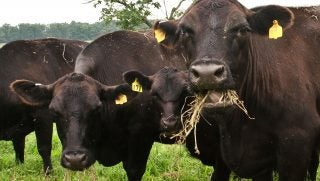If you believe that locally sourced food products mark the best path forward for the ag industry and that they could — or should — be more widely integrated into the nation’s food system, you will walk away thoroughly satisfied with the new documentary “Farmers For America.”
Meanwhile, people who see a more nuanced yet diversified approach to making agriculture successful in the future will bristle at the exclusion of agricultural technology and genetics and soil science in the film’s discussion. There are some positive takeaways about the passion and drive of young people entering the industry, but there are also red flags in the movie early on: When the urban farmer from Detroit declares that she farms her way because she says that other growers “spray the hell” out of their potatoes and carrots, the tone of the film and its messaging are clearly set.
“Farmers For America” premiered Thursday evening to an audience at the Indianapolis City Market, not coincidentally during the same week that the National FFA Convention & Expo was being held in the city. Almost 150 people — including many farmers, ag educators, and FFA members — were in attendance, as was the filmmaker, Graham Meriwether, who led a brief panel discussion after the screening.
Hear what was said during the panel discussion by clicking here.
Meriwether said that the Mike Rowe-narrated movie had three goals:
- To celebrate farmers,
- To inspire young people to start farming,
- To support young farmers.
To achieve that, it opened with iconic imagery of American farmland and well-traveled narration about the hard-working men and women who wake up before the sunrise. It went on to visit farmers who succeed at their craft largely by tapping into niche spaces on a regional level. I couldn’t help but feel that all of the talking points associated with today’s romanticized picture of hobby farming were hit: the escape from cubicle life, the backyard garden plots, the focus on hand tools. The reality is that we’re in a world that needs a varied approach to agriculture, where big and little, conventional and organic, and young and old farmers collectively contribute to feeding and clothing society. “Farmers for America” channeled a one-dimensional approach to our future, where the scalability of the few is frowned upon — instead, it became exclusively about having more souls in the system, even if it’s only 2 acres at a time.
“Farmers For America” targets the Millennial urban and suburban generation, and it casts blame for some of the woes affecting the ag industry, such as corporate consolidation and foreign investment in American farmland, as reasons young people are being priced out of owning their own properties. It criticized the increasing size of Midwest farms as the reason that high schools are merged and small towns fade away.
By comparison, those farmers who may not have grown up in the industry and whose foundations are “simple tools” and hard work are celebrated as the wholesome alternative to larger production farmers — while not directly speaking ill of large-scale farmers, there was a sense of vilification by omission.
The truth is, many of the farmers who are featured in the film should be celebrated for what they do. They are genuine, passionate, smart, and productive. Their contributions are immensely valuable to the food system of choice that we have in the U.S. And some of the film’s partner organizations — such as the National Young Farmers Coalition and the Farmer Veteran Coalition — do great and noble things for the farmers they serve. In fact, we at AGDAILY personally know a couple of the farmers who spoke in the film, and we have little doubt that most of those featured are dedicated to trying to do what’s best for their families and their farms, no matter the size or type.
Choosing to get into agriculture, with the unique trials it affords, is more than a career choice. It has to be a lifestyle decision. It’s just that the specific lifestyles of the “Farmers For America” subjects aren’t the only ones out there.
Much of what’s said in the movie isn’t wrong, just incomplete or underexplored. There are very few outright misconceptions that made it through the editing process. The dousing of potatoes and carrots that the one farmer mentioned of course doesn’t happen. Another young farmer claims that, by national organic standards, no pesticides can ever be used on crops. Yet by featuring farmers connected to the massive Organic Valley cooperative and highlighting such polarizing figures as “Food, Inc.” star Joel Salatin, not to mention the film production company’s funding incentives from Chipotle, it’s easy to see why the film’s focus is on only one path forward in ag.
This isn’t a film that should divide the public or farmers as aggressively as some documentaries of the past have, and that alone is a good thing. However, the narrative presented here reinforces some distorted perceptions about what farming today is all about, and in its effort to highlight a diverse array of specialty crops, it actually fails to show how diverse agriculture really is.
Ryan Tipps is the managing editor for AGDAILY. He has covered farming since 2011, and his writing has been honored by state- and national-level agricultural organizations.



